Last October, I had the chance to visit the oldest Carmen avocado tree in the USA, and I thought I would come away with a better understanding of the variety. The tree had a metal USDA tag still attached to it, from when it was held in quarantine after the budwood had been brought up from Mexico. I assessed the shape and growth pattern of the 30-year old tree’s canopy, I looked at the fruit hanging on it, I noted the flowers or lack thereof. Yet I remained unsettled about how this quirky avocado variety worked.
In that moment, I also recognized that I would never fully understand Carmen so it was time to write this profile.
Carmen fruit
Carmen avocados look like Hass avocados, pretty much (see above); and Carmens taste like Hass, pretty much. I really like Hass, so in my view, this means that Carmens too are among the most delicious of all avocados.
But I say “pretty much” because there are situations where Carmen avocados differ from Hass in their appearance and taste, and this is related to the Carmen tree’s peculiar flowering habit.
Carmen flowering
Most avocado trees flower once per year, and they do so in the spring. Not Carmen. Carmen trees can flower during multiple seasons of the year.
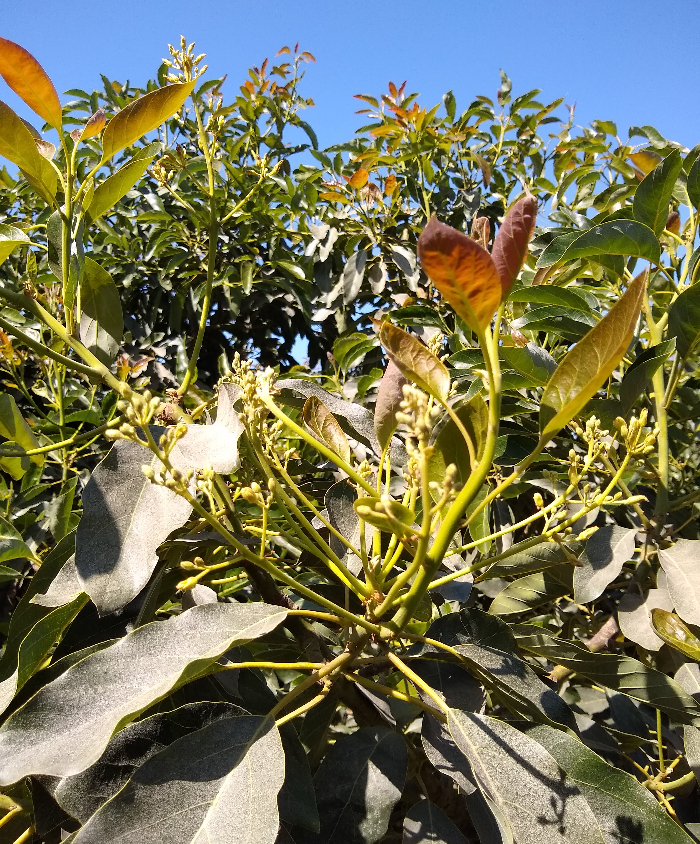
Carmen avocados that start to grow in seasons other than spring look different. They are usually rounder, sometimes smoother skinned, slightly smaller, and sometimes more scarred from thrips insects.
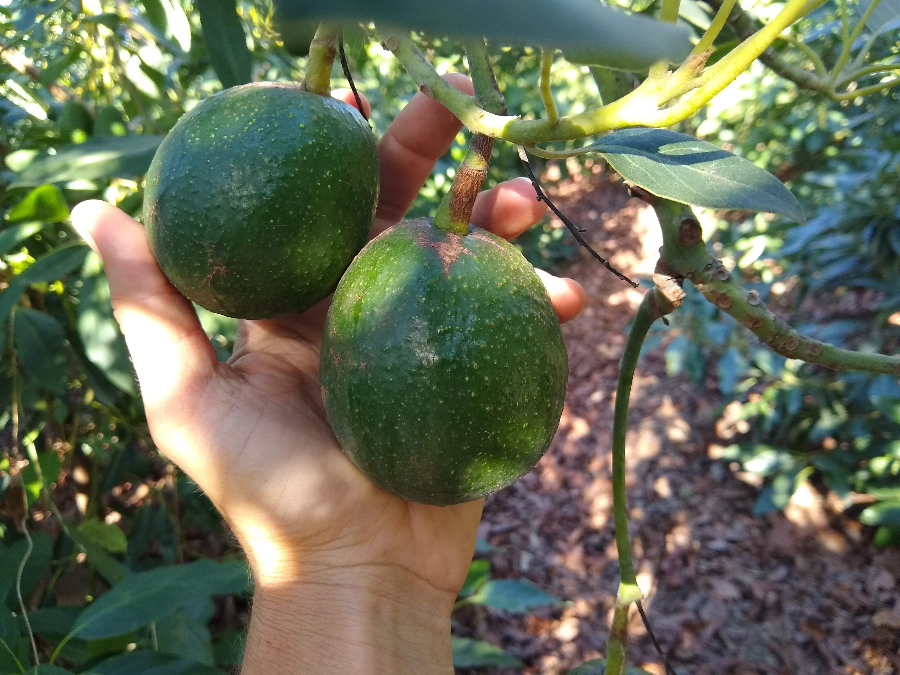
Flowers during seasons other than spring are called “off bloom.” In my observations, Carmen trees growing close to the ocean can have this off bloom.
Here are locations where I’ve seen Carmen trees having off bloom: Ventura, Santa Paula, La Selva Beach, San Jose, Mission Viejo, Irvine, Corona Del Mar, and Chula Vista. None are more than a dozen miles from the ocean.
Carmen trees that I’ve seen farther inland do not consistently have off bloom, and some never do.
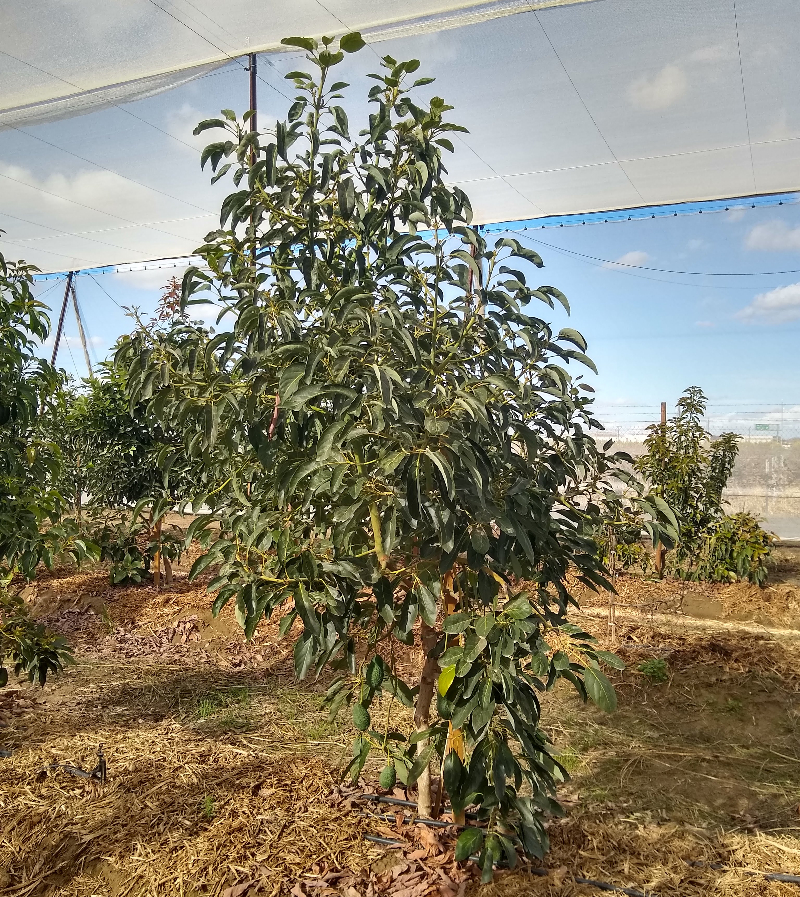
However, even inland Carmen trees will usually flower at least a little earlier than adjacent Hass trees.
Because of this slightly earlier bloom on inland (and all) Carmen trees, the fruit usually taste a little richer earlier in the year compared to Hass trees in the same location.
Why are Carmen avocados so similar to Hass, and why do I keep comparing them to Hass? Because Carmen is said to be a Hass sport, a natural mutation found on a Hass tree. So I feel like my main job here is to distinguish the two and explain why some people choose to grow Carmen over Hass.
But before going forward and talking about a few more tree characteristics, let’s go back in time.
Carmen history
The mother Carmen tree was discovered in about 1986 in the Basilia Valley near Uruapan, Mexico, and a farmer named Carlos Mendez began observing it. It was noticed that the tree had a robust early flowering compared to surrounding Hass trees and hence had a more substantial early crop.
Through taking branches from this tree and grafting them to make new trees it was seen that the mother Carmen tree was truly distinct, as the new trees also exhibited the mother’s behavior.
Mendez began propagating Carmen trees in abundance because their early crop often fetched a high price.
In 1996-1997, in collaboration with Brokaw Nursery in Ventura County, California, the Carmen avocado variety was imported into the US and a patent application was filed. In the patent, the variety is referred to as “Mendez No. 1,” and in Mexico it is still referred to as Mendez, as in, “the Mendez type of Hass.” But for introduction to California and the rest of the world, a different name was chosen and trademarked: “Hass Carmen.” Nevertheless, just as no one in Mexico calls it “Mendez No. 1,” no one in California calls it “Hass Carmen.” Here it is referred to simply as Carmen.
The oldest Carmen tree that I saw last October was made from the budwood imported in the late 1990s and is located at the Brokaws’ Cheravo Ranch in Santa Paula.
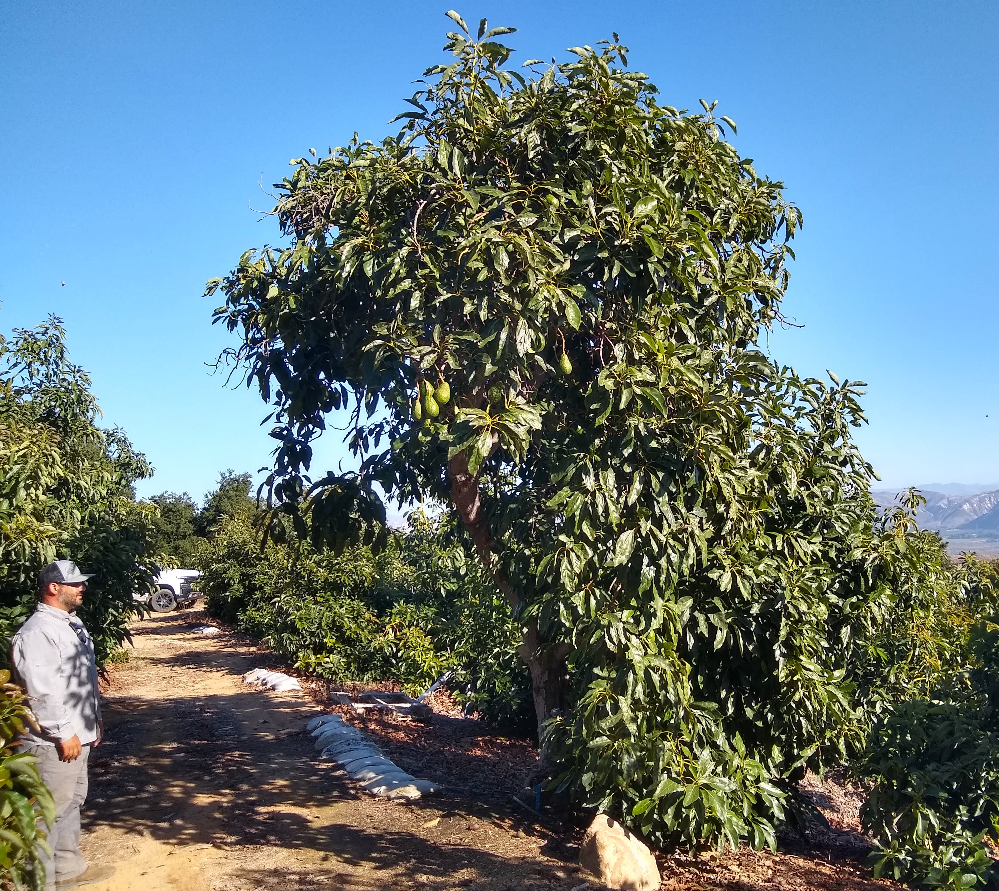
From that point, Brokaw Nursery began testing Carmen trees and propagating the variety for growers in California.
Carmen tree growth
Carmen avocado trees show a couple of other small differences from Hass besides the flowering behavior. One is that Carmen canopies often look more compact.
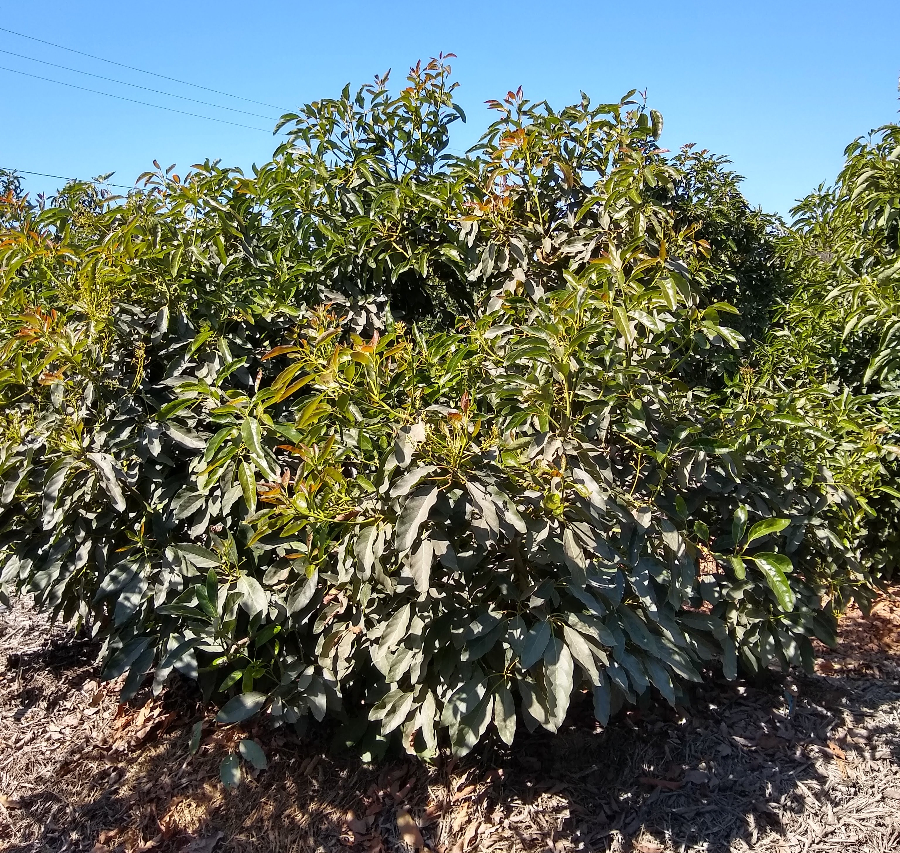
This is partly due to Carmen’s fall-season shoot growth having many lateral branches.
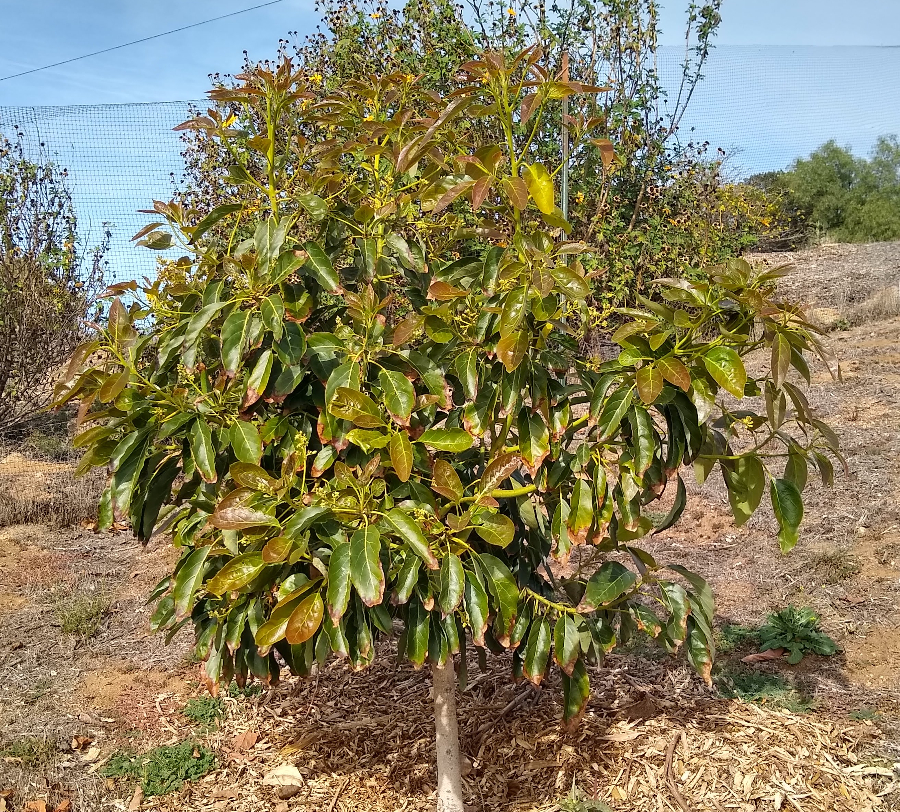
Also distinguishing it from Hass, Carmen’s fall growth has odd, fattened stems. They look as if they’re being prevented from elongating so they swell.
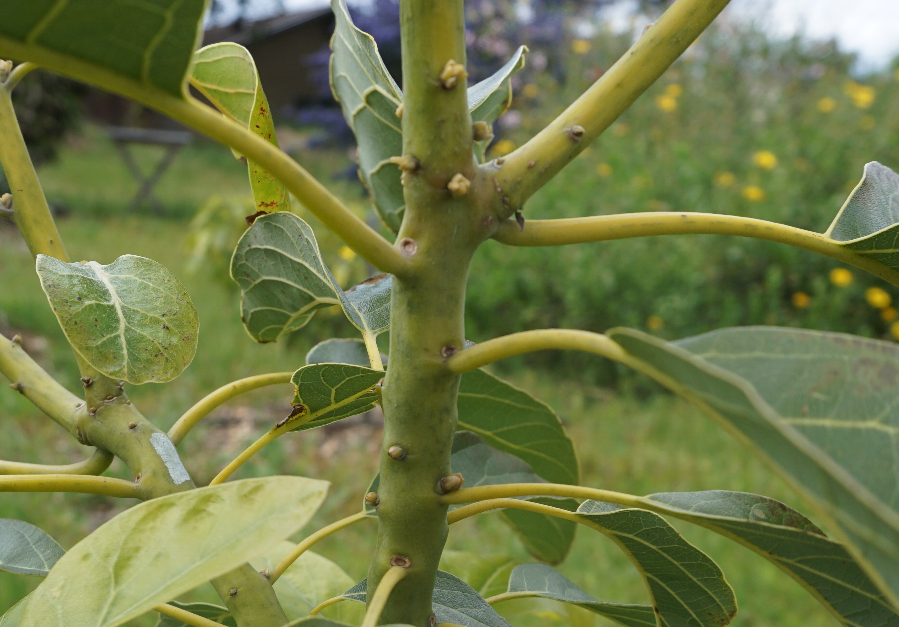
But just as the off-season flowering of Carmen happens more on the trees near the coast, I’ve noticed that off-season and bushy vegetative growth is also more often a feature of Carmen trees near the coast.
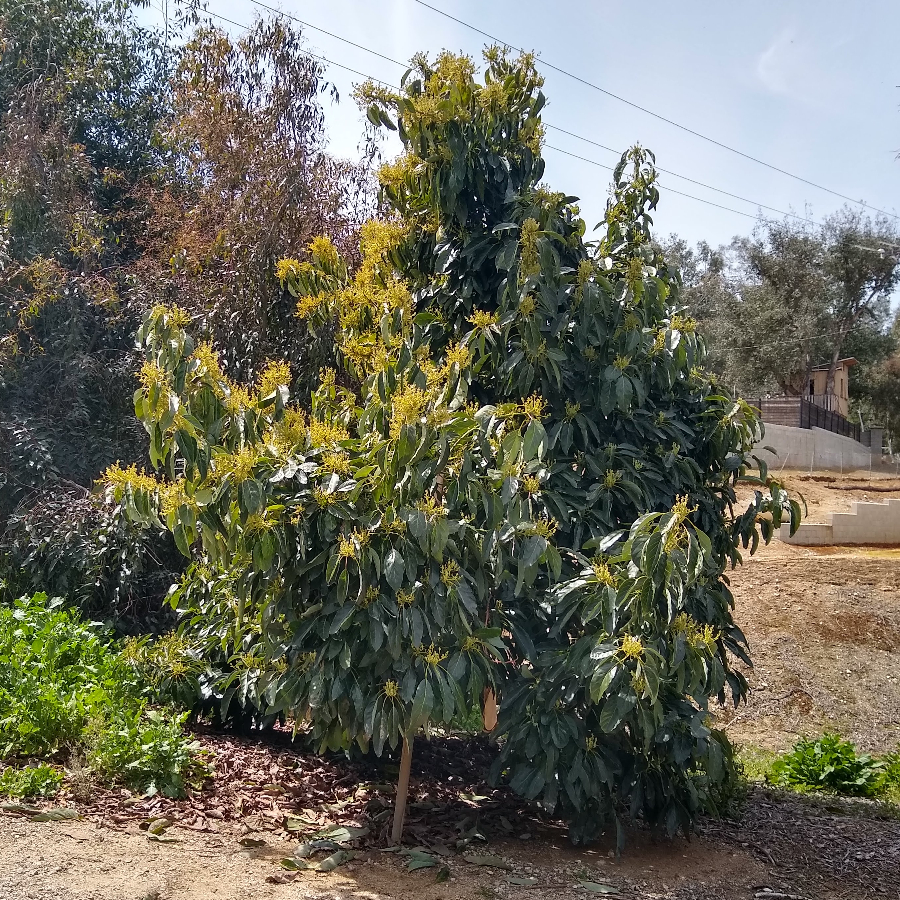
(For more on these characteristics, see Mary Lu Arpaia’s presentation on Carmen for the California Avocado Society seminar on February 2021 at 1:32.)
Precocity
Carmen avocado trees that I’ve seen seem slightly more precocious compared to Hass. In other words, the trees will flower at a younger age and therefore potentially fruit more at a younger age.
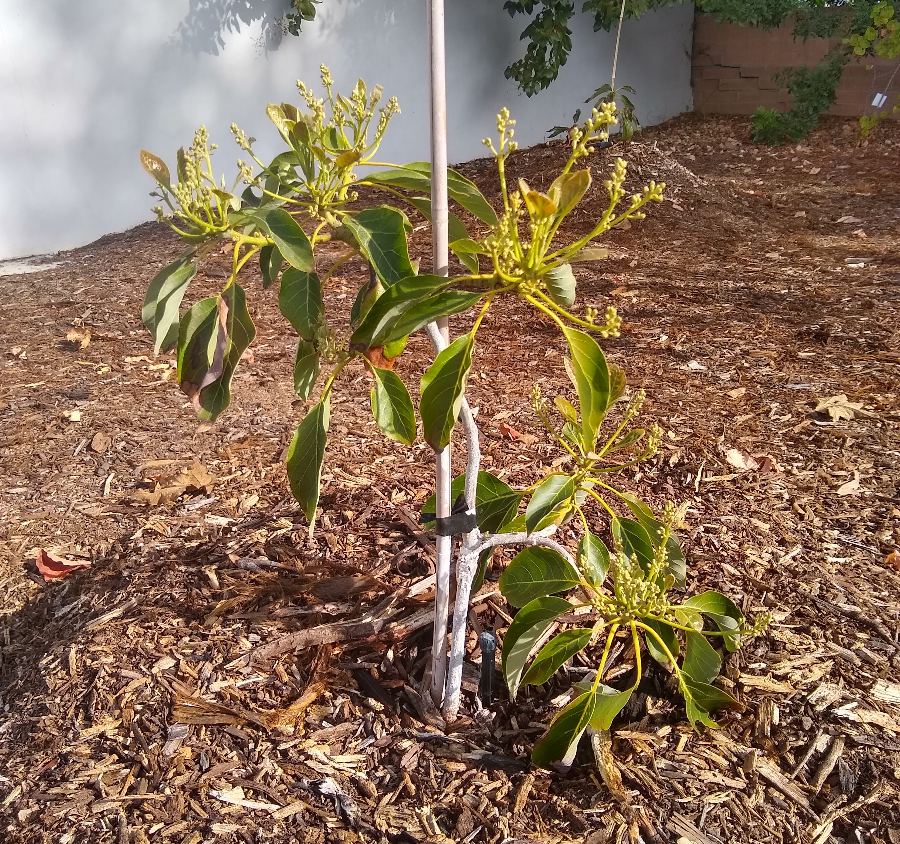
There is an ongoing University of California trial in Somis, Ventura County, comparing multiple avocado varieties. When I visited in 2019, I received a handout of yield data which showed that the first year’s yields (2015) counted GEM at an average of 7.5 kilograms per tree; Reed, Lamb, and Carmen at about 4 kg/tree; and Hass at about 2 kg/tree.
Precocity can also manifest on older trees as a quicker return to fruiting after pruning. You can prune a Carmen tree this year and it will do more flowering next year compared to a Hass that is similarly pruned. This is an advantage if you want to keep a tree small and need to prune it yearly, whether because you have a small yard or want to grow in a high-density commercial grove.
Carmen in the heat and cold
In the patent, it is claimed that in Mexico, Carmen demonstrated greater frost tolerance than Hass. However, I have seen no such evidence in my yard or elsewhere in California.
How about heat tolerance? I have seen Carmen trees doing well in hot locations, but not obviously better than nearby Hass.
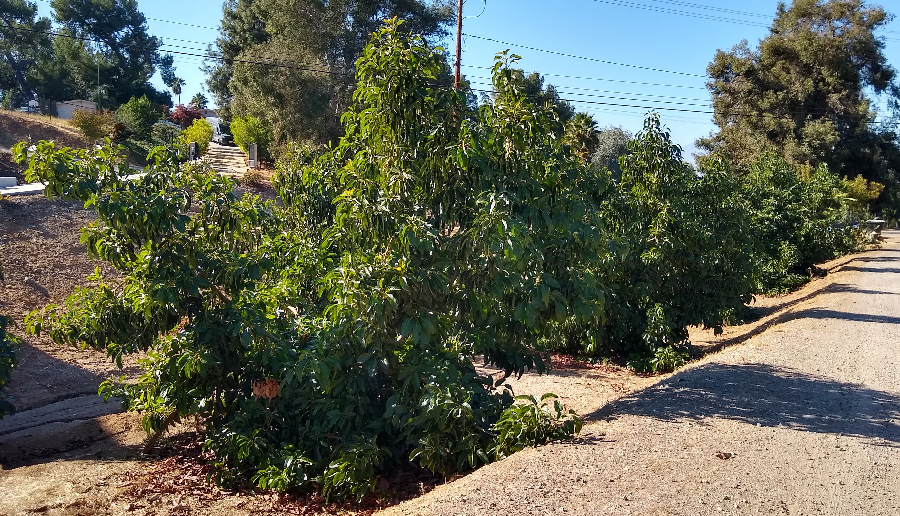
Carmen harvest season
The Hass harvest season runs from about March through June in most Southern California locations. Comparatively, Carmen’s main harvest season for a tree in an inland location is the same in length but it can start a tad earlier.
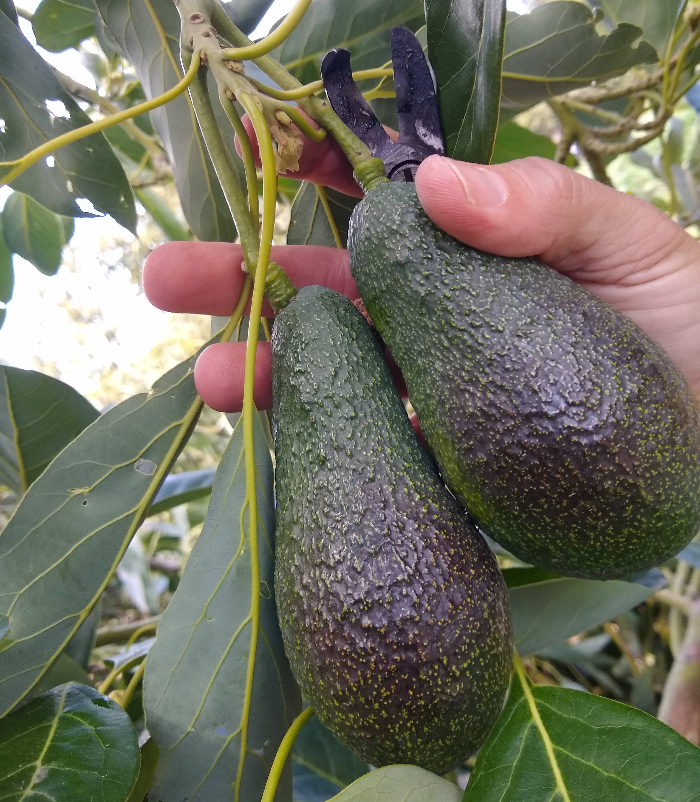
For locations near the beach, Carmen usually has two main harvest seasons: one about the same time as Hass (March through June) and one in the fall from the previous year’s off bloom (harvested mostly in November and December).
The size of each harvest varies according to how many flowers there were and how good the weather was for pollination. The UC trial in Somis has found that Carmen trees there have produced about the same amount of fruit in both seasons, but I know other Carmen trees that have varying amounts of fruit to harvest at different times of year. This goes to say that it is only a wish to think that a single Carmen tree will offer an even supply of avocados throughout the year, although one could have at least something to pick in every season.
Is Carmen a fit for your yard?
My favorite Carmen tree, and one of my favorite avocado trees in the world, is this one in the yard of my friends Ellen and Freddy:
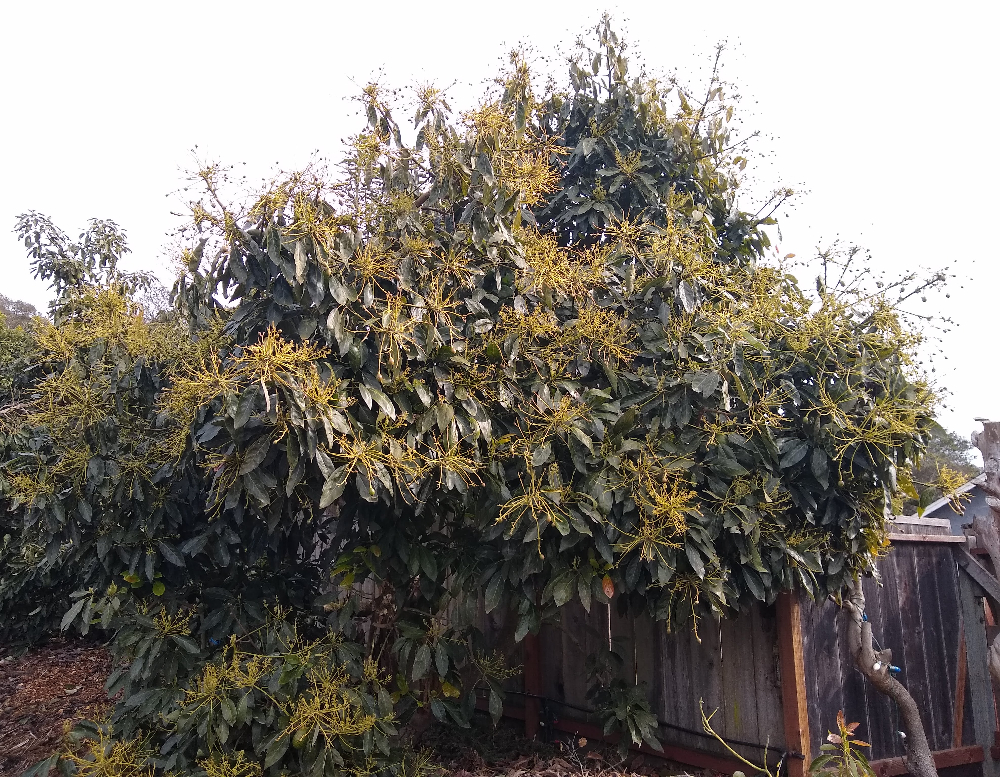
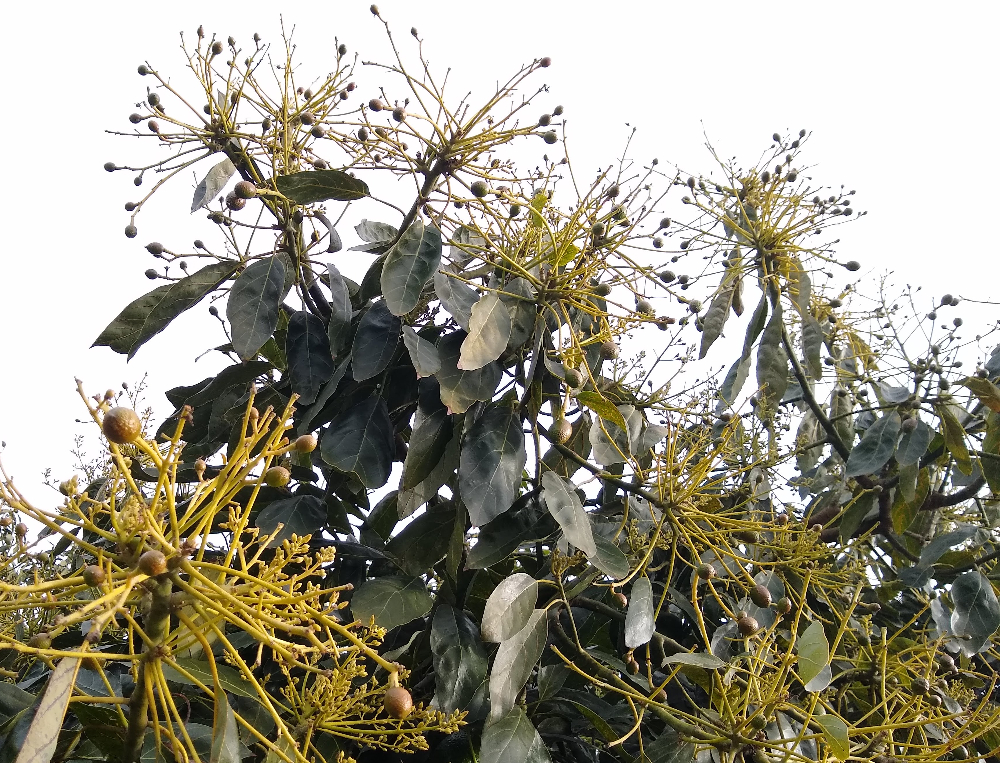
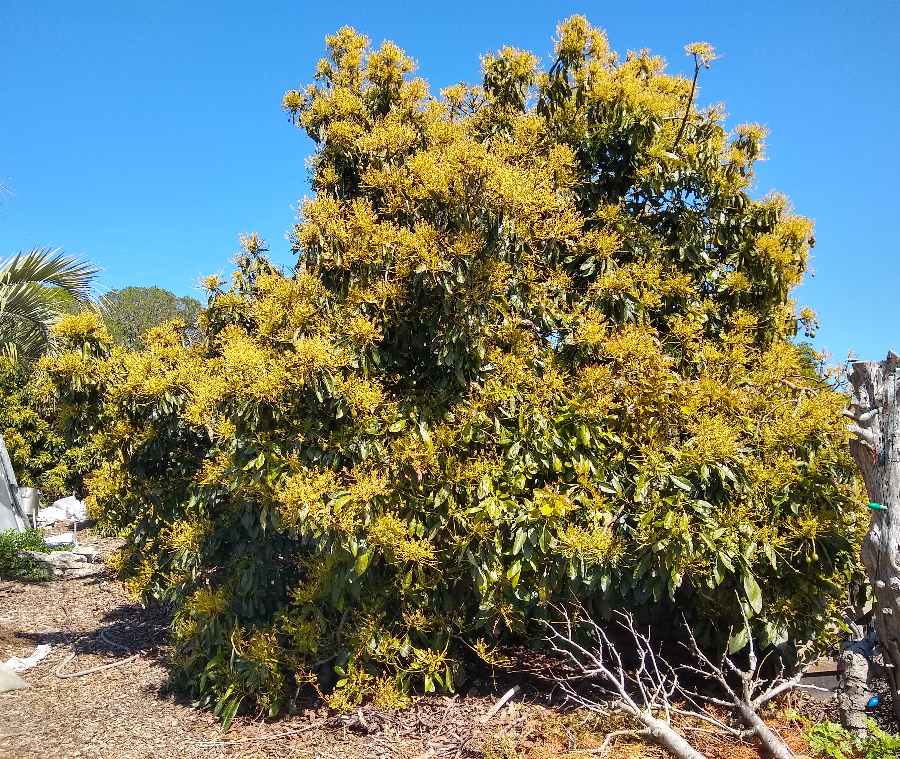
I’ve never seen the tree sleep. It incessantly grows, flowers, and fruits – a lot. This tree’s location is near Santa Cruz, less than a mile from the ocean.
If you live near enough to the ocean, you can expect a Carmen tree to be precocious and active, producing more than one crop per year, at least in some years, possibly approaching the performance of Ellen and Freddy’s tree.
If you live farther inland, who knows how a Carmen tree will behave in your yard? Beyond about twenty miles from the ocean, I would not expect a Carmen tree to act much differently from a Hass, in terms of flowering and harvest seasons.
So is a Carmen avocado tree a good fit for your yard? It depends on what you want and where you’re planting it.
Carmen is possibly a superior choice for an inland gardener or farmer who intends to plant the tree in a small space or multiple trees in high density and therefore need to prune at least once each year. The Carmen tree could then average a slightly higher yield compared to Hass because of its precocity.
But I imagine that Carmen would be most attractive and suitable for a gardener within a dozen miles of the ocean with space for only one tree. In this scenario, the tree is likely to have at least a few avocados to harvest during more months of the year than any other variety.
I like that scenario, but I still don’t feel like I understand Carmen well enough to say exactly when and where it will happen. Even on that oldest Carmen tree in the USA, last October it had a main crop but no off-bloom crop and no flowers showing. What a quirky variety, this Carmen.
Here is a video profile of the Carmen avocado tree:
Thanks for your support so I can keep the Yard Posts coming and the ads away.
All of my Yard Posts are listed here.

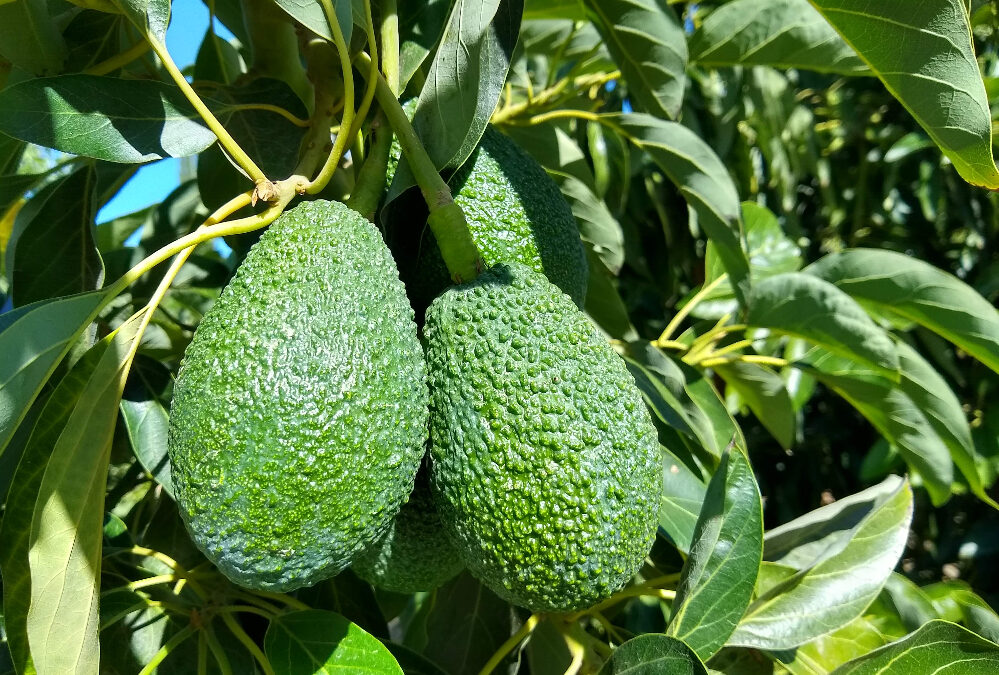


Hi Greg – Ordered! Interesting that it is a coastal friendly type. I can’t remember if you offered a dedicated Carmen delivery last year or if they were in a bundled group. Looking forward to more avocados since we stretched the last batch out and we have 1 left which will disappear by tomorrow! Thanks as always for the education.
Hi Mariangela,
You’re right. I only mixed Carmen with other varieties last year, but many have given me the feedback that last year’s Carmens were among their favorites of all the varieties so I figured they deserved their own box this year. Hope you enjoy them!
Bought a Carmen tree a month ago here in Modesto Ca . It’s from Four Winds Growers . Has many blooms right away. Thick leaves some lateral branches. Looks good with new leaf sprouts.
This is interesting, Augie. I’ve noticed that some leaves on my Carmen are thick also. I haven’t observed this on all Carmens but I’m going to pay more attention to it.
Hi Greg I live in Hemet and want to try a Carmen-Hass in my smaller yard. Thanks, Steven.
What do you think about the wild Avocado Criollo ? At flea market Modesto I tasted one . Thin green skin big pit n it tasted very good .
Hi Augie,
There are many types of avocados referred to as “criollo” and I’ve also tasted some that are good. One thing they have in common is big seeds! (At least all the ones I’ve eaten have had big seeds.) Some nurseries use those criollo seeds to propagate clonal rootstocks since they’re so big and full of energy. I wonder which trees those avocados at the Modesto flea market came from.
Criollo Avocado seedling is growing very fast at 3 feet in short time. Big thick leaves thick trunk . Frost has not hurt the tree . Last heat in Central Valley didnt hurt the Criollo either. Meanwhile Carmen n Reed drooped leaves . I shaded them . We’re going through 30degree days no problem. I planted Criollo into ground yesterday. Thinking of grafting another variety like Mexicola Grande on a side shoot . Roots are tough.
Epicenter sells a variety called Phoenix. Theys say its just another name for Carman. Do you know why they call it Phoenix? Do other people use that name too? Thanks for selling Carman fruit, it was my favorite variety last year!
Hi Monty,
Epicenter wants to avoid any trademark issues so they refer to their trees as Phoenix, but they are the same physical variety as Carmen/Mendez. My own Carmen tree comes from Epicenter (Ellen and Freddy, owners of the best Carmen in the universe!).
I just picked the first Carmens and they look really good. Can’t wait to eat them this year.
Greg,
I am in Costa Mesa. Perfect location for the off bloom harvest, or so I thought. The off bloom potential is why I included Carmen amongst my trees. I have only seen the tree sprout fall blooms twice, which were five and seven years ago. The result was zero fruit which at the time did not concern me since it was a young tree at the time. The last two Fall seasons nada! I am hoping that the cooler than typical temperatures the last two seasons were the cause. It truly is a quirky tree.
Thanks for sharing this, Don. I would think Costa Mesa would have off bloom more often. This crazy Carmen!
Greg I have a Carmen Hass from Laguna Hills Nursery by way of Brokaw Nursery ( Orange #1 sleeve) . 2022 it gave me one bloom cycle in the Spring and about 50 avocados in Spring of 2023. This years fruit yield is about 20 avocados and blooming now 4/7/2024. This tree is at a property in the San Gabriel Valley.
Thanks, David. Making a guess as to why your Carmen hasn’t had off bloom, I’d say it’s the inland location since I know young Carmens that had off blooms in 2022 and 2023, and they were all close to the ocean. But going forward, maybe there will be years with certain weather that still cause yours to give extra or early flowering. Please keep me posted.
By the way, I’ve seen a number of Carmens planted in a little plot at Cal Poly Pomona — not terribly far from you — and they had no off bloom when I saw them, and the manager said they never had. But that was back in 2018.
I live about 1-2 miles inñand from Laguna Beach in Laguna Niguel….I planted a Carmen about 3 years ago ( 15 gallon ). Not sure which is supposed to be the larger crop. Last two years only 4 medium sized avocados. This year it set fruit in January ( like over 100). So think maybe that is the main fruit set….now is starting to shoot out new leaves again this month ( April).
Aloha;
In the spring of 2018, I planted a Wurtz, Reed, and a Futurate. My property is 6 miles from the ocean at 1200 feet elevation, 19 degrees North , 155 degrees west. I just harvested my last Wurtz today from last spring bloom and it is the 30th fruit from that little tree!! The wurts tree is about 6 feet tall but 10 feet in diameter. Looking at the fruit set today, I estimate about 100 fruit for late fall harvest. The Futurate, put out about 10 I harvested in January, The Reed has not set any fruit!!
I am wondering about the Carmen for Hawaii and if I can get scion wood for that variety? I have 30 trees growing from seed that could use a graft.
I enjoy your posts, and have learned a great deal from you!
I am a new avocado grower in the Modesto area as far a I know.
I have 2 Carmen/Haas trees that are now 6 years old. .
I harvested 2 pieces of fruit from the trees in late March 2024.
I just discovered this post. Since I live in the Modesto area, I would like for Ellen and Freddie to reach via email to me. I have a lot of questions.
Thanks in advance,
C.D.
Greg, is it difficult to tell what fruit is ripe since a Carmen can bloom at any time of year? Do you just look for the dark skin and assume that is ripe?
I have a Carmen Hass from Four Winds about six years old and eight feet tall.
Because I prune my avocado trees apical, no laterals over 1/3 the size of trunk and no lateral branches below about 20 inches, I have plenty of scions to graft.
I graft seed avocados with that carmen and sell for $150 to $200 each with 6 to 10 avocados hanging from them.
My point is this:
The original carmen hass has never had one avocado, it flowers very well and that’s it. The carmen is between a kona sharwil and a pinkerton but there are plenty of gems around here.
crazy carmen
My Carmen is flowering right now in Santa Ana, about 13 miles from Newport Pier. It’s about 6 feet tall and bushy-ish, growing in a 2-foot tree box. Exciting! Wish i could post a pic…
Hi Greg. I have several young avocado trees and was wondering when I can graft scions to my trees. Any particular time of year ? I have a 6 year old fuerte tree and A 4 year old Mexicola tree that I would like graft scions onto.
Thank you and enjoy your website and knowledge.
Hi Barbara,
Check out this post: https://gregalder.com/yardposts/grafting-avocados/
Hi ti all,
I live in Modesto ca. I have 2 Carmen Hass trees that are 6 years old. They set a full bloom and also set at least 75 avocados on each tree this spring. Last week I harvested a few for Christmas but as it turned out, they were not ready to be eaten so we placed them on the kitchen counter for 7 days in which we ate last evening at a family event. I am looking for the proper time to expect to harvest. Also, I read elsewhere that the best place to store the fruit is on the tree. Is that good information?
I am getting impatient and very anxious to harvest.
CD
Hi CD,
The harvest season for Carmen can’t be pinned to calendar dates like most other avocado varieties because Carmen can bloom and set fruit at various times throughout the year, mostly depending on location. My guess is that at your location in Modesto, Carmen doesn’t have a proper “off” bloom but only a slightly early bloom. In other words, it might start blooming in December, which is slightly early, but it doesn’t have an “off” bloom which would occur in August and September and October (almost totally opposite of the normal spring bloom period).
What all this means is that Carmen is not easy to harvest. You have to get to know the look of the fruit when it is mature, and this might take a few years. One characteristic that will always work though is judging by the skin color: if it is blushed with black, then it is mature.
Otherwise, yes, the best place to keep the fruit until you’re ready to eat them is on the tree.
Hi Greg,
I found a seed grown “loca” in the Bay area. I call Loca Land.
How rare is a new loca variety grown from a seed?
Gregory
Hi Gregory,
So you found a seedling of Carmen? I don’t know of any Carmen seedlings, but I’d be curious to see how they behaved (and tasted, of course!).
Hi Greg,
I will let you know how things progress and the results we get. The fruit and the flowering would make me think it is likely a Carmen.
I asked Gray how common a loca from a seed is and he said it is extremely rare but we shall see…
Thanks!
Gregory